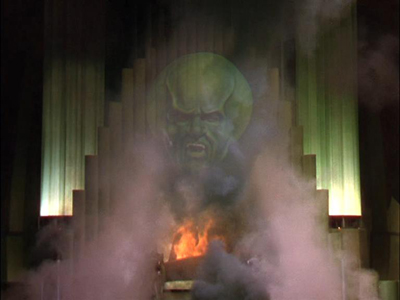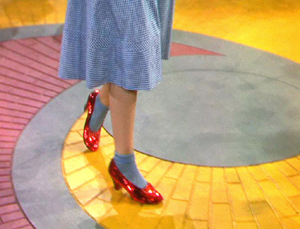Chaos in the Land of Oz
Wizard of Oz: [speaking in a booming voice into microphone] I am the great and powerful… [then, realizing that it is useless to continue his masquerade, moves away from microphone, speaks in a normal voice]
Wizard of Oz: … Wizard of Oz.
Last week, Elliott and I interviewed Russ Winter of Winter Watch at Wall Street Examiner about his take on the markets and the economy. Here’s part I. ~ Ilene
 Ilene: Hi Russ. So, tell us about life in the world of finance.
Ilene: Hi Russ. So, tell us about life in the world of finance.
Russ: Right now, I’m very much focused on a phrase I call "The Wizard of Oz." The Wizard of Oz is the Federal Reserve, the governments, the U.S. Treasury, and the "Troika." You need to understand these organizations to invest today. You need to hire old apparatchiks from the old Soviet Union, because the basis of the 2009-2011 bull market is massive government intervention.
For instance, the spending of the U.S. Treasury, the U.S. government, right now is 25% of GDP. The norm is 18%. So that means 7% of GDP can be attributed to the government propping up this economy. You have huge transfer payments used for paying off banksters and keeping the system going. A lot of the transfers go to the wealthy "kleptocrats." That’s one of the reasons we had a 400% increase in the price of Tiffany’s, while Wal-Mart is on it’s butt. Is it any mystery that protests against Wall Street and kleptocrats are on the rise?
So that’s the effect. You really have to be an old apparatchik Russian guy; those guys would do really well in an environment like this.
Elliott: I remember back in the 70s, there were people who were "Kremlinologists" and "Kremlin watchers" and so it seems now that in order to be an investor you have to be a "Fedologist."
Russ: Yeah, it’s ridiculous. Everybody is extremely focused on the Fed, every utterance, every rumor, every shill that they run. And they end up being pump-and-dumps a lot of times.
Elliott: There’s Jon Hilsentrath with the Wall Street Journal, Bernanke’s favorite "sounding board."
Russ: Absolutely, and Steve Liesman. He’s a shill, and you can actually quote me on that. They run the rumors, the pump-and-dumps, that they need to operate. The problem for investors, small investors especially, is that if you’re too tied in to what they’re saying, you end up being victimized by the gaming. For instance, CNBC is a good source for figuring out what the current pump-and-dump schemes are.
Scarecrow: I haven’t got a brain… only straw.
Dorothy: How can you talk if you haven’t got a brain?
Scarecrow: I don’t know… But some people without brains do an awful lot of talking… don’t they?
CNBC spent the last six, nine months pumping up emerging markets and commodities, and look what’s happened to the investors who followed that? Emerging markets are now down on the order of 30%. There’s a good sized commodity correction going on. It doesn’t pay to buy these guys hook, line and sinker. It’s dangerous. As a result of pumping up a massive Treasury bubble, the system has been able to maintain this 7% extra spending. But neither the Bubble nor the spending can be sustained.

Government borrowing is highly dependent on the Fed. It’s not a real market, it’s rigged. The Fed is far too much of a presence, and now we have an enormous unsustainable debt. And everybody’s trading around what the Fed says, what they’re gonna do, how they will interfere with the market.
Another aspect of this treasury bubble is that the government is going to be subjected to credit downgrades. Same thing that happened in Europe. Look at European yields, two, three years ago, look at the yields of Portugal, Ireland and Greece. The yields were two and three percent. Now they’re double digits. Nobody can convince me that the US is immune to that. These are debt traps. You get into a situation where you can’t borrow any more at these low interest rates. Once the interest rates start spiking, they’ll lose control of the situation. It’s a major game-changer.
And so I think investors and speculators need to put this into their thinking, tattoo it on their foreheads: the potential exists for the United States government to completely lose control of these ultra-low interest rates. The low interest rates don’t really do any good. They punish savers. It’s not good policy anyway, and when you get into a debt trap and credit downgrades, it spirals out of control. I think that’s on the horizon.
The key to helping Europe is to shrink the banking sector. The banking sector is too large in all these countries. It’s a parasite. The large banks provide no social good. But these interests, the interests of "banksters," have captured governments. The banksters control the governments and loot them endlessly. That’s what these bailouts are about.
The old-style, regional small banks aren’t the problem. The problem is we have a "too big to fail" system, and they just run these dynamite strapped routines, and they own the government.
So if you look at the discussion going on in Europe, it centers around the idea of debt forgiveness, maybe starting with Greece, writing off debt. But the banksters won’t go along with that. That’s the political battle going on in Greece.
Elliott: It sounds like the immovable object running into the irresistible force.
Russ: They control these governments. Even though there are popular movements, which may eventually vote these guys out, at the present time, we’ll send Turbo Timmy Geithner over to Europe and he’ll just run the same programs. He’s totally corrupt, dangerous, and he’ll pressure these guys to save the banking sector. That’s a "dynamite straps" theory. They’ll show up and say, "If you don’t bail us out and save us, we’ll blow up the world."
Ellott: Right, they were saying that back in ’08, how if we didn’t do the bailouts, we’d end up with martial law.
Russ: So here we are, three years later repeating the pattern. Now we have sovereign debt problems that are out of control. There has to be a major restructuring of debt in Europe, probably not just Greece, but also the other peripheral countries. Sure there has to be some austerity and some reform, but make the banksters take losses. If we don’t see some major banks shutting down in this next six months, look out. We’re heading a lot lower. Countries that do it right, laying the pain at the banksters’ doorsteps, will start healing. There will be some pain, but there’s pain already, and eventually they’ll recover.
Ilene: So you see some hope that countries will restructure their debts and force the banks to take losses? It seems the 2008-09 meltdown and subsequent events showed that the law doesn’t apply to these special bankster people. They got bailouts, loans from the Fed, outrageous sums of money for "bonuses", and only a token few were prosecuted. I wonder on what basis the Federal government and Fed had the legal authority to plunge the country so deeply into debt – to be extracted from taxpayers – for the purpose of bailing out private too-big-to-fail entities? If the situation was so dire that the world would end if the banks failed, the government should have taken them over, not saved them. So back to the question, what gives you hope that anything has changed?
Russ: I don’t think it’s going to be done politically. There are popular movements, people who hit the streets. The German perspective is probably the best. The country has a triple-A rating. The German people don’t want to be dragged down into a tar pit, bailing out all these countries around Europe. If they stand up to these guys then there’s hope, but I don’t invest on hope. (See Russ’s "Is Germany the Great Savior of Europe?")
I hate these kind of rallies, where they float a rumor that there’s going to be another bailout and these "boys in the sandbox" get out and drive stocks up 6%. You’ll notice that these rallies don’t last because it’s not sound economics.
Elliott: One of the things I’m trying to figure out is the Dollar. It ran in a channel between 73 and 76 for the last six months, and then in the last three weeks it broke out in a big way, and now it’s trading in the 78 to 79 range.
Russ: A lot of that is probably technical. Many of these carry trades that have gone on around the world are all in dollars, you remember the cost of borrowing in dollars is nothing, if you do it right. So if you’re a speculator you’re borrowing dollars and jumping into emerging markets, or gold or commodities, or whatever, and then once those trades come undone, it’s a technical factor that causes the dollar to rally.
Elliott: Do you see the Dollar breaking back down to the 73-76 range or below?
Russ: I don’t know. The Dollar could go up, if this carry trade continues to unwind. I have a feeling right now that, for people out there in trouble, they keep running these rumors, to try to help them out.
Ilene: Do you mean the Banksters are running rumors to drive the Dollar down and the stock market up?
Russ: Yes, the people who run the trades, finance the trades, benefit from the fees and commissions, who skim the fractions off the trade, the pump and dumpsters, it all ties together. If you invest or speculate, you better understand the big picture.
There’s also a lot of shorts in the market. People are classically over-trading the market. People have to, there’s no return on their money, so they’re in there playing something. You gotta play something, you gotta be short something, or you gotta be long something, or you gotta be doing a carry trade. That’s because the banking sector is too large. It dominates our economy. The real economy has shrunken while these monkeys play these games.
The most bullish thing that could happen is for this system to come to a final end. Until that happens, I would not be a long term investor. Really, you can only gamble with the rest of these guys, and with a clear understanding of what is transpiring. To turn long-term bullish, we need to see these banking systems shrink, and a lot of debt get forgiven.
I could go on and on about moral hazard and the apparatchik Soviet Union Russian type behavior it engenders. Ultimately it comes back to shrinking the banking sector, making them take the hit, starting to forgive the debt – restructuring the debt, and resetting the plate for the whole economy. That means wiping out banksters, taking their equity, closing down their banks, taking their bondholders and wiping them out. That absorbs a lot of the debt out there and properly places it. To take that debt and put it on the back of Germany and France now is insane.
Now, the other aspect that’s going on is that China has been a huge story. China is a disaster waiting to happen. I noted that on September 12 there was a story out of Shanghai where seven of these large operators, businesses, manufacturers just shut down the same day, leaving huge amounts of debt unpaid. Most of these guys fled the country. Now there are more and more of these stories involving hundreds if not thousands of firms. They haven’t paid their workers. It’s a slash and burn economy. There’s totally inefficient development, waste, building unoccupied cities – vanity projects. Yet when you step back and look at China, 35% of their sewage is untreated. So they do everything out of order, everything is "big splash," something that could collect a fee or loot and steal, and put it in the ratlines rather than really solving the problem. I think that’s very much what’s happening in China.
Elliott: You know, it’s kind of unfortunate to use the phrase "35% untreated sewage" and "big splash" in the same sentence.
Russ: (laughs) You got that right. It’s a very, very unstable system. We have a boom/bust economy. When you print money the way they have, you distort the economy, you get strange things happening. You get a boom, and then all of a sudden, nine months later, you have a bust. It is not based upon proper development. It amazes me how this slash-and-burn mentality has taken hold. One of the stories you’ll hear right now in the market is "buy big-cap multinationals. Cheap stocks." They sell at really low PE’s, especially relative to treasuries. Well, you know, there’s actually some truth to that, until you actually start digging down into the groups that constitute these multinationals. And I saw a great quote. I want to pass this on, from the CEO of Sanofi-Aventis (SNY). Sanofi is a major French drug company. His name is Christopher A. Viehbacher and he says "I am a bit envious of companies whose products have been accused of contributing to health problems. I’d like to have the same P/E as the people who make soda pop and potato chips." Then the article goes on to say that the soft drink sector now has an average P/E ratio of 16, according to Thomson Reuters, and Sanofi is 7.5. I think that illustrates what’s going on. Companies are rewarded for irresponsible activity in our global economy.
Elliott: Well, there’s definitely been a trend over the last 30 years. 30 years ago, corporations were expected to have a duty to the community, to their employees, as well as their investors. And now it’s like the investors are completely paramount and everybody else isn’t even on the radar.

Russ: It’s just a mentality out there that you can get away with giving people diabetes, and get rewarded with a high P/E ratio and a great growth story, while a company like Sanofi (SNY) struggles to come up with a medicine to heal these people. Then the government comes in and controls drug prices, and tries to dictate to them. Yet they let these other guys run amok.
Why is it that Pepsi’s at 16 times earnings, why is McDonald’s at 16 times earnings, why are these drug companies selling for nothing? It’s because the system is set up all wrong. Can it be reformed? I don’t know. I think you just have to be very cynical about what you do. Try to invest as much with angels as much as you can. Don’t try to stoop down to behaviors that everybody else is involved in, even though its very popular. As an investor, I’d look at a Sanofi over a Pepsi or a McDonalds. It’s investing with angels.
Ilene: What other companies, besides Sanofi, do you like?
Russ: I have a theme called the third Industrial Revolution that relates to energy transformation away from fossil fuels (especially oil). I was doing some buying below SPY 1100 (but not now) in names like FWLT, COP, SHAW, GTAT, ASYS. I also like some other drug companies like AMGN and LLY. If I see names – I have a watch list – selling for under 5 times enterprise value to EBITDA in what I call "doing God’s work" sector (the non-criminals), I take a look. I am shorting luxury retailers like TIF, WFM and ANF, and also XRT via selling naked calls (the premiums are high) at the upper end of the range. I am also short 2 and 5 year Treasury futures. My moves are covered in my Actionable Subscription service.
Elliott: In other words, try to find the people who are creating true value, real wealth and doing it without destroying everything around them.
Russ: Yeah, exactly.
Elliott: Well, we have to start thinking about what this economy is supposed to be doing again. Does the economy exist to serve the human race, or does the human race exist to serve the economy?
Russ: Or does the economy exist to serve a group of kleptocrats and crooks?
Elliott: Remember Dave Chappell and his interviews with Rick James, when Rick would say "Cocaine is a hell of a drug"? Dave would ask Rick about his bizarre behavior, the insane things that went on, and Rick would reply with "cocaine is a hell of a drug." I find myself thinking if you were to interview some of these people and they were to be as honest as Rick James, when you start asking them why were you doing this, the answer would be "money is a hell of a drug."
Ilene: In addition to money-lust, I think a quest for power goes along with it too.
Russ: Well, the system has been set up for the kleptocrats and crooks. There’s no prosecution. Nobody has gone to jail for the 2008 scandals, unless it’s just blatant, like Bernie Madoff. My big criticism of Presidente Hopium is that no one’s gone to jail. He didn’t have to deal with Republicans on this. He could have beefed up the Department of Justice and hired prosecutors. Why has he not laid a glove on these people? It’s not an excuse he can lay at the foot of the Republicans, it’s too late for that.
Ilene: Where are we headed?
 Russ: There are people realizing this is not a sustainable system, but they’ve gotten so trapped into it. I don’t think they can do more than "at the margin" type things. Geithner might go because Obama might decide that to get re-elected, he’ll need more of a populist agenda, so he’ll get rid of Geithner. They’ll just replace him with another crony capitalist. I don’t think the outcome is good. In Europe, I’m kind of interested to see if maybe they do some debt forgiveness there, for instance in Greece.
Russ: There are people realizing this is not a sustainable system, but they’ve gotten so trapped into it. I don’t think they can do more than "at the margin" type things. Geithner might go because Obama might decide that to get re-elected, he’ll need more of a populist agenda, so he’ll get rid of Geithner. They’ll just replace him with another crony capitalist. I don’t think the outcome is good. In Europe, I’m kind of interested to see if maybe they do some debt forgiveness there, for instance in Greece.
Elliott: Well, we’ve heard a lot about the possibility of "debt contagion" in Europe, if Greece were to default. I think what they’re really afraid of is the idea of a debt forgiveness contagion spreading.
Russ: Well, that’s what’s required.
Elliott: Because once one guy gets forgiven over a giant debt, the next guy standing next to him goes "hey, wait, how come he got his debt forgiven, and I still have to carry this giant burden? Screw that! I want to get forgiven too!"
Russ: Right, well, these countries are trapped, they’re in debt traps, and who loaned them the money? Typically this debt is held by the banking system.
But an indebted country has a moral obligation to default on that loan if paying it would mean starving its people. Extreme austerity is a trap. Defaulting is not that big of a deal. They did it in the 1980’s with the Brady bonds. They did it in Brazil, in Argentina. Those countries got re-established, and here we are 20 years later. It’s not the end of the world. Banks have been going out of business for centuries. Look at the United States, the British were constantly loaning money for railroad construction, canal construction, there were booms and busts. They lost money. And they’d come back two years later and do it all over again. So the idea that because some big banks go under its the end of the world is bullshit. It’s not how banking and economic history has worked.
Wizard of Oz: You, my friend, are a victim of disorganized thinking. You are under the unfortunate impression that just because you run away you have no courage; you’re confusing courage with wisdom.


